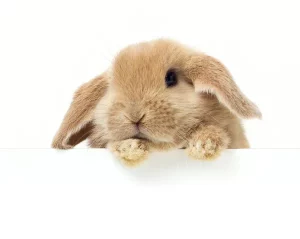Whether you are a new rabbit owner or an experienced one, all rabbit owners should know what their rabbit needs to live a healthy and happy life. In general, rabbits need a healthy diet and a spacious enclosure to be happy and healthy.


When caring for your rabbit, rabbit owners should always make sure their rabbits have the following:
- Unlimited access to hay (alfalfa for young and some older rabbits, timothy hay for adult rabbits)
- Toys and enrichment
- A pelleted diet recommended by your veterinarian
- Fresh produce daily (such as romaine lettuce, carrot tops, other leafy greens)
- A “rabbit-proof” room – where they can’t get into cabinets, chew through wires or baseboards, or get out of small crevices
- A floor level, secure lockable enclosure
Always avoid the following for your rabbit:
- Eating harmful foods (avocados, garlic, onions, chocolate, caffeine, mushrooms, xylitol or other artificial sweeteners, alcohol, and foods high in salt or sugar)
- Leaving your rabbit unattended – rabbits will chew anything they can when unsupervised and may ingest deadly poison or foreign objects
- Leaving or putting your rabbit outside – where there are potential predators and possibly rabbit hemorrhagic disease virus, a newly documented deadly virus that can be passed to pet rabbits from wild rabbits
- Offer seed-based diets or treats – these foods are high in fat, and rabbits’ gastrointestinal (GI) systems are not equipped for high-fat items. In fact, they can cause life-threatening GI stasis (a slowdown in the passage of food through the GI tract) and should be avoided.
- Trimming teeth at home – rabbits shouldn’t need their teeth trimmed, and if they do, they probably have underlying dental disease. Additionally, there is no safe way to effectively trim your rabbit’s teeth at home. Always consult and take your rabbit to your veterinarian for a proper dental examination
- Use of essential oils – these are potentially toxic to your rabbit if they ingest or inhale them
Conclusion
Make sure your rabbit has an annual health check so your vet can advise you on your rabbit’s overall health. If your rabbit shows any abnormal behavior, call your vet to have them checked out as soon as possible. Seek medical help if your rabbit experiences any of the following:
- Dizziness
- Pain or discomfort
- Bloody or discolored urine
- Indisposed
- Decreased fecal output
For more information on how to meet your rabbit’s specific medical and behavioral needs, call us to make an appointment!


